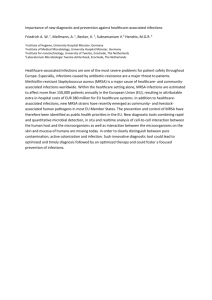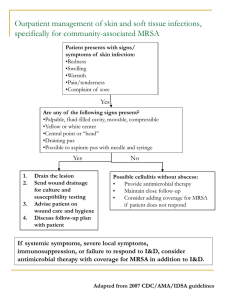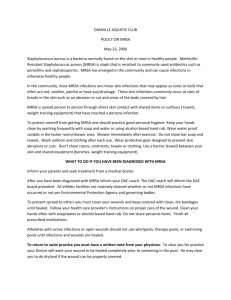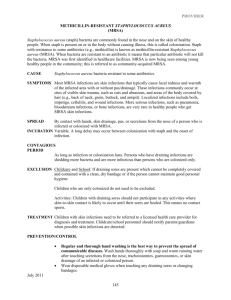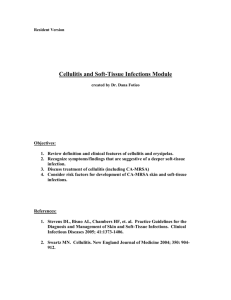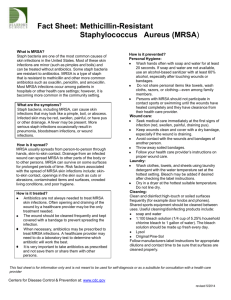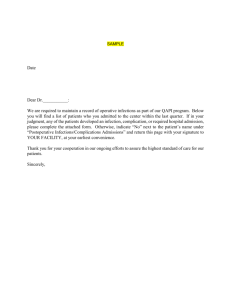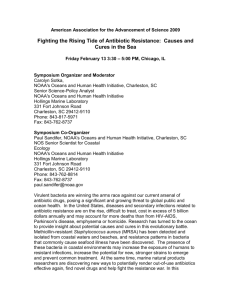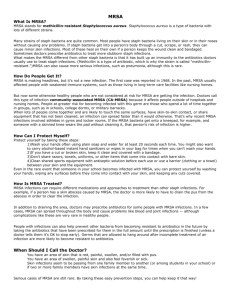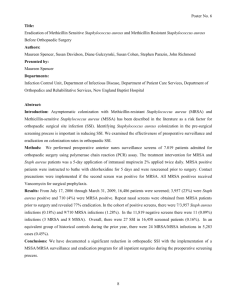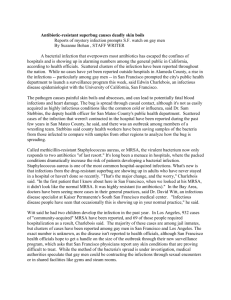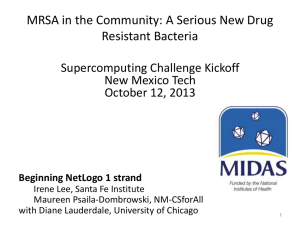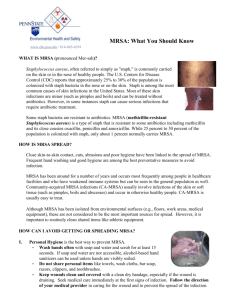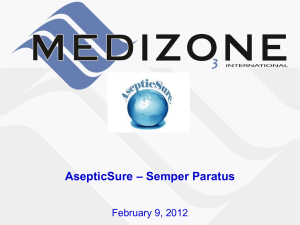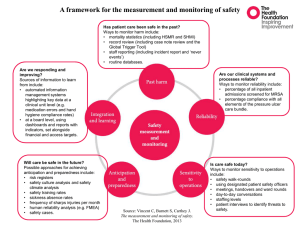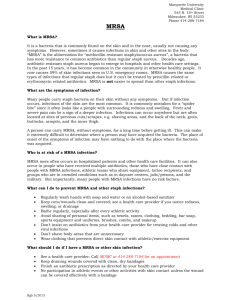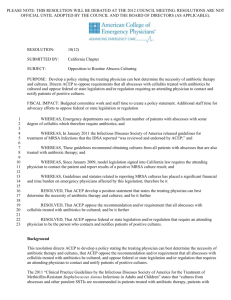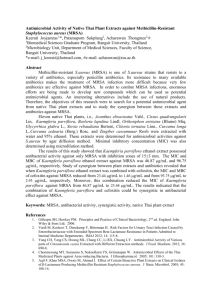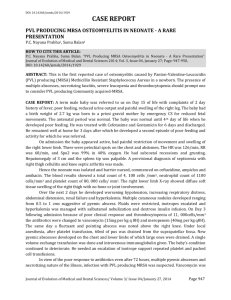How to Treat Skin Infections, Including MRSA, in 2008 Erik Schraga
advertisement
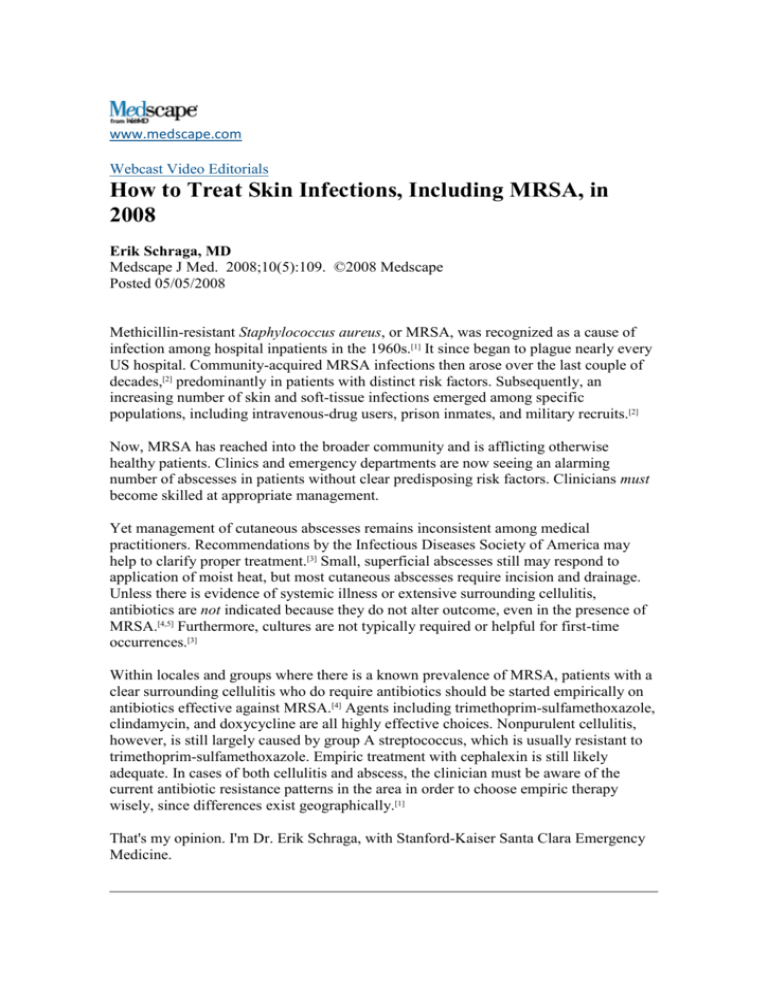
www.medscape.com Webcast Video Editorials How to Treat Skin Infections, Including MRSA, in 2008 Erik Schraga, MD Medscape J Med. 2008;10(5):109. ©2008 Medscape Posted 05/05/2008 Methicillin-resistant Staphylococcus aureus, or MRSA, was recognized as a cause of infection among hospital inpatients in the 1960s.[1] It since began to plague nearly every US hospital. Community-acquired MRSA infections then arose over the last couple of decades,[2] predominantly in patients with distinct risk factors. Subsequently, an increasing number of skin and soft-tissue infections emerged among specific populations, including intravenous-drug users, prison inmates, and military recruits.[2] Now, MRSA has reached into the broader community and is afflicting otherwise healthy patients. Clinics and emergency departments are now seeing an alarming number of abscesses in patients without clear predisposing risk factors. Clinicians must become skilled at appropriate management. Yet management of cutaneous abscesses remains inconsistent among medical practitioners. Recommendations by the Infectious Diseases Society of America may help to clarify proper treatment.[3] Small, superficial abscesses still may respond to application of moist heat, but most cutaneous abscesses require incision and drainage. Unless there is evidence of systemic illness or extensive surrounding cellulitis, antibiotics are not indicated because they do not alter outcome, even in the presence of MRSA.[4,5] Furthermore, cultures are not typically required or helpful for first-time occurrences.[3] Within locales and groups where there is a known prevalence of MRSA, patients with a clear surrounding cellulitis who do require antibiotics should be started empirically on antibiotics effective against MRSA.[4] Agents including trimethoprim-sulfamethoxazole, clindamycin, and doxycycline are all highly effective choices. Nonpurulent cellulitis, however, is still largely caused by group A streptococcus, which is usually resistant to trimethoprim-sulfamethoxazole. Empiric treatment with cephalexin is still likely adequate. In cases of both cellulitis and abscess, the clinician must be aware of the current antibiotic resistance patterns in the area in order to choose empiric therapy wisely, since differences exist geographically.[1] That's my opinion. I'm Dr. Erik Schraga, with Stanford-Kaiser Santa Clara Emergency Medicine. Reader Comments on: How to Treat Skin Infections, Including MRSA, in 2008 See reader comments on this article and provide your own. Readers are encouraged to respond to the author at eschraga@gmail.com or to George Lundberg, MD, Editor in Chief of The Medscape Journal of Medicine, for the editor's eyes only or for possible publication as an actual Letter in the Medscape Journal via email: glundberg@medscape.net References 1. Klevens R, Edwards JR, Andrus ML, Peterson KD, Dudeck MA, Horan TC. Invasive methicillin-resistant Staphylococcus aureus infections in the United States. JAMA. 2007;298:1763-1771. Abstract 2. Daum R. Skin and soft-tissue infections caused by methicillin-resistant Staphylococcus aureus. N Engl J Med. 2007;357:380-390. Abstract 3. Stevens D, Bisno AL, Chambers HF, et al. Practice guidelines for the diagnosis and management of skin and soft-tissue infections. Clin Infect Dis. 2005;41:1373-1406. Abstract 4. Moran GJ, Krishnadasan A, Gorwitz RJ, et al. Methicillin-resistant S. aureus infections among patients in the emergency department. N Engl J Med. 2006;355:666-667. Abstract 5. Hankin A, Everett WW. Are antibiotics necessary after incision and drainage of a cutaneous abscess? Ann Emerg Med. 2007;50:49-51. Erik Schraga, MD, Staff Physician, Mills-Peninsula Medical Center, Burlingame, California; Clinical Instructor of Emergency Medicine, Stanford-Kaiser Santa Clara Emergency Medicine Residency Program, Santa Clara, California Author's email: eschraga@gmail.com Disclosure: Erik Schraga, MD, has disclosed no relevant financial relationships in addition to his employment. Anibal Anibal Sosa, MD Director, International Program & Clinical Advisor Alliance for the Prudent Use of Antibiotics (APUA) 75 Kneeland Street Boston, MA 02111, USA Tel: (617)636-2709 Fax: (617)636-3999 skype: adejsosa Email: anibal.sosa@tufts.edu www.apua.org *********************************************************************** ** P please don't print this e-mail unless you really need to *********************************************************************** ** CONFIDENTIALITY NOTICE. This email and attachments, if any, may contain confidential information that is privileged and protected from disclosure by Federal and State confidentiality laws, rules or regulations. This email and attachments, if any, are intended for the designated addressee only. If you are not the designated addressee, you are hereby notified that any disclosure, copying, or distribution of the email and its attachments, if any, may be unlawful and may subject you to legal consequences. If you have receive
